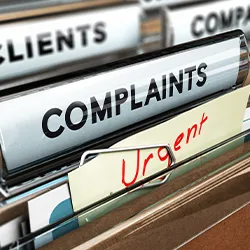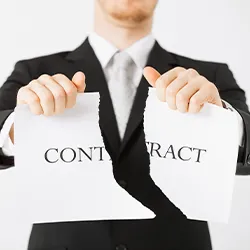If you’re dealing with a legal issue, having a lawyer who truly fights for you is crucial. But what happens if you start feeling like your attorney isn’t putting in the effort you expected?
It can be frustrating, especially when relying on them to protect your rights. Many clients come to Schmidt & Clark, LLP after feeling dissatisfied with their previous legal representation.
Could your lawyer be falling short? Here’s what to look for and how to address the situation effectively to avoid hiring a bad lawyer.
Quick Summary
- Lawyers must adhere to strict professional conduct rules: Attorneys are bound by ethical standards and legal requirements, which ensure they act in their client's best interests. Violations can result in disciplinary actions or disbarment.
- If your attorney isn't acting in your best interest, you have options to address the issue. You can take steps such as requesting a second opinion, filing a formal complaint, or even pursuing legal action if your lawyer’s conduct falls below acceptable standards.
- Choose a lawyer with expertise in their field, whether it's family law, malpractice, or personal injury. Specialization matters. Attorneys who focus on a specific practice area bring knowledge and experience that can greatly improve your chances of a favorable outcome.
6 Signs That My Lawyer Is Not Fighting for Me

A lawyer is a representative of clients, an officer of the legal system, and a public citizen having special responsibility for the quality of justice. Lawyers, as guardians of the law, play a vital role in the preservation of society. The fulfillment of this role requires an understanding by lawyers of their relationship with and function in our legal system. A consequent obligation of lawyers is to maintain the highest standards of ethical conduct Texas Center for Legal Ethics
Common signs that your lawyer isn’t working in your favor include:
- Lack of Interest in Your Well-Being — A good lawyer prioritizes their client’s interests. If your lawyer isn't, it may be time to seek a second opinion.
- Avoiding Communication — If your lawyer consistently avoids your calls or emails, it’s a red flag. You have a right to ask questions and be informed.
- Failure to Inform You of Case Developments — A lawyer keeps you updated on settlement offers, new evidence, or essential court dates. Regular updates should be a norm, not a rarity.
- Poor Legal Service — Bad advice, missing court appearances, or showing up unprepared are signs of subpar legal counsel.
- Ignoring Your Instructions — If you’ve communicated what you want and your lawyer takes actions contrary to that, it disregards your wishes. Clear communication regarding legal expenses is also crucial to avoid unexpected costs.
- Weak Bargaining — A lawyer who doesn’t push hard enough in negotiations could cost you significantly, especially in cases like accidents, custody battles, or divorce. Hiring a competent divorce attorney ensures your interests are actively fought for during divorce proceedings.
4 Steps to Take if a Lawyer Isn’t Doing Their Job
Here are all the options if a personal injury lawyer isn’t fighting for you or showing professional negligence.
1. Communicate Your Concerns
Start by addressing the issue directly with your lawyer. Express your concerns about their performance or lack of communication. Many issues can be resolved through a clear conversation.
Estimated Timeframe: Schedule a meeting and determine possible improvements may take 1-2 weeks.
2. Request Your Case File and Documentation
Ask for your case file and relevant documentation if the conversation doesn't resolve the problem.
This will allow you to understand what has been done so far and provide the necessary materials if you decide to seek a second opinion.
Estimated Timeframe: Lawyers are usually required to provide your case file promptly, typically within a week..
3. Seek a Second Opinion
Contact another attorney for a second opinion on your case. They can review your case file and advise whether your current lawyer is mishandling it or if there's a better course of action.
Estimated Timeframe: Depending on availability, finding and consulting with a new lawyer can take 2-3 weeks.
4. File a Complaint or Change Lawyers
If your current lawyer is not fulfilling their duties, you can file a formal complaint with your state’s bar association.
Alternatively, you may decide to change lawyers. Hiring new representation and transitioning the case may take some time.
Estimated Timeframe: Filing a complaint and hiring a new lawyer may take 1-2 months, depending on the complexity of the case.
Note: This can have downsides. Your new legal representative will have to get up to speed with your case quickly, which will cost you money. It is also crucial to hire a competent attorney who can effectively counter the tactics employed by a wife's lawyer. Also, as it’s time-consuming, it may cause delays.
Taking Control of Your Legal Representation
Taking control of your legal representation is vital to achieving the best possible outcome in your case. This involves being proactive, maintaining open lines of communication with your lawyer, and making well-informed decisions about your representation.Here are some tips to help you take control of your legal representation:
- Communicate Effectively: Don’t hesitate to ask questions, provide relevant information, and keep your lawyer informed about any changes or updates in your case.
- Be Proactive: Take the initiative to move your case forward. Don’t wait for your lawyer to take action; stay engaged and involved.
- Make Informed Decisions: Educate yourself about the legal process and make decisions based on a thorough understanding of your situation.
- Seek a Second Opinion: If you’re not satisfied with your current lawyer, consider consulting another attorney for a second opinion.
By taking an active role in your legal representation, you can ensure that your interests are prioritized and that you receive the best possible outcome in your case.
3 Things to Look for in a Lawyer

- Open communication — Good lawyers will answer your calls and keep you updated. You should have your attorney’s phone number and be able to reach them via email and other means of communication.
- Track record and experience — Look for a law firm with years of experience. A proven track record of successful cases is also important. You can look for representation online. For example, check state bars and see past clients’ testimonials.
- Values and honesty — When you first interview with your new attorney, you’ll see their values and what kind of person they are. Choose attorneys who will keep your best interests at heart and lawyers whose values match yours. This can make all the difference in how successful your client-attorney relationship is.
Experience Matters
When choosing a lawyer, experience is a critical factor that can significantly impact the outcome of your case. A lawyer with extensive experience in handling cases similar to yours can provide invaluable insight and guidance, helping you navigate the legal system more effectively.Here are some reasons why experience matters:
- Knowledge of the Legal System: An experienced lawyer deeply understands the legal system and can easily navigate it.
- Familiarity with the Court: An experienced lawyer is well-versed in court procedures, which can help streamline the process and avoid unnecessary delays.
- Ability to Anticipate Challenges: An experienced lawyer can foresee potential challenges and develop strategies to address them proactively.
- Network of Contacts: An experienced lawyer has a robust network of contacts, including other lawyers, judges, and experts, which can be instrumental in building a strong case.
By choosing a lawyer with a proven track record and extensive experience, you can ensure you receive the best possible representation and outcome in your case.
FAQs:
What should I do if my lawyer isn't communicating with me?
If your lawyer isn’t responsive, first try contacting them through various methods like email, phone calls, or scheduling an in-person meeting. If they still don’t respond, you may want to consider finding new representation or filing a complaint with the local bar association.
Can I switch lawyers in the middle of a case?
Yes, you can switch lawyers at any point during your case. However, it’s important to note that switching lawyers could cause delays and additional costs, as the new attorney will need time to catch up on your case.
How do I file a complaint against my lawyer?
To file a complaint, you must contact the state bar or legal regulatory authority where your lawyer is licensed. You’ll likely need to provide details and documentation of the lawyer’s misconduct or negligence.
Can I get a refund if I fire my lawyer?
If you have prepaid fees or there are unused funds in a retainer, you may be entitled to a refund. Check the terms of your agreement with the lawyer and discuss refund policies before terminating their services.
How can I tell if my lawyer is competent and capable of handling my case?
Hire a Lawyer from a Trustworthy Law Firm
Attorneys have to follow specific rules. If your lawyer is avoiding communication and not giving you good advice, you should ask yourself if the lawyer is fighting for you. However, to avoid this, be careful when choosing a legal representative.
Clear communication regarding legal expenses is crucial to avoid unexpected costs and ensure transparency. Schmidt & Clark, LLP lawyers, will go the extra mile for you. Our lawyers are experts in various legal fields and represent individual plaintiffs. Contact us for free consultations today, and put your case in the expert’s hands.
References:
- https://www.courts.wa.gov/court_rules/?fa=court_rules.rules
- https://www.americanbar.org/groups/professional_responsibility/publications

 Published by
Published by 

